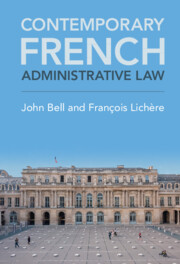There have been many presentations of French administrative law to an English-speaking audience since Dicey wrote more than 135 years ago. The most comprehensive coverage was last written more than twenty years ago. One of the co-authors was an author of that edition of Brown and Bell, French Administrative Law (5th edition). A lot has changed in that time, not least the importance of the European dimension in French law (and its decline in English law). It seemed best to both of the present authors to start a contemporary presentation of French administrative law from a clean slate.
As we explain in Chapter 1, the importance of French constitutional law, European Union law and the European Convention on Human Rights has reshaped French administrative law in the past fifty years. In their turn, French administrative lawyers have also contributed to shaping these influential sources of law. French administrative law is less a self-standing branch of law than it once was.
The aim of this work is to provide an introduction to French administrative law, so it is necessarily limited in length. Although Legifrance and the Conseil d’Etat websites provide some translations of legislation and case law, they are limited. In order to go further, the reader really does have to make use of French-language sources, many of which are available electronically.
We have worked together on the different chapters. Our aim has been to blend French rigour, system and principle with English attention to cases and empiricism. We hope we have taken the best of both pedagogical traditions and made them into a coherent whole. We also hope that this collaboration will encourage similar collaborations between colleagues from different jurisdictions in the future.
We each owe debts of gratitude to various individuals. We both took part in a number of meetings over the best part of a decade in which French judges and academics met with British judges and academics, often supplemented by members of the European courts and some national jurisdictions. These meetings enabled us to test out the extent of differences between the different legal traditions and to understand contemporary points of convergence and divergence. We are grateful in particular to the former president of the Section du Contentieux, Bernard Stirn, who made possible these meetings. Particularly important in organising those meetings and in shaping our ideas were Mattias Guyomar (now of the European Court of Human Rights) and Duncan Fairgrieve. Among the active participants was Lord Reed, whose insights into British and European laws was particularly helpful.
John Bell owes a particular debt of gratitude to Neville Brown, who gave a young academic opportunities to work on French law, and who was a cheerful and supportive collaborator. We shared membership of Pembroke College Cambridge. Roger Errera gave an opportunity to be a stagiaire in the Conseil d’Etat for six months in 1986, which provided the chance to understand how French administrative law operates in practice. Tony Bradley gave the first chance to write on comparative administrative law, bringing contacts with French lawyers and judges.
François Lichère owes debt to the members of the Conseil d’Etat just quoted, who embody French administrative law and helped him to better understand the rationale of French administrative law. He is also indebted to John Bell and Duncan Fairgrieve for introducing him to English administrative law, which in turn helped him to better understand French administrative law.
We have tried to make the text accurate up to 1 May 2021. The production process in the period of the Covid-19 pandemic has inevitably been longer than usual, but we hope this has not affected the currency of what we have written.

